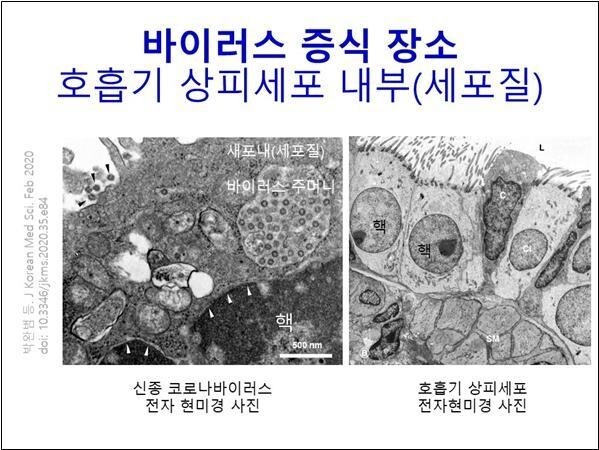hankyoreh
Links to other country sites 다른 나라 사이트 링크
Reactivation cases are likely detections of deactivated viruses, experts say

With over 270 “reactivation” cases reported to date involving patients who were diagnosed with COVID-19 a second time after being pronounced fully recovered, physicians who have treated them suggested the results are likely the result of previously deactivated viruses being detected rather than cases of the virus reactivating or patients becoming reinfected.
The Central Clinical Committee for Emerging Disease Control, headed by chairperson Oh Myung-don, commented on the issue during a press conference on Apr. 29 at the National Medical Center in Seoul’s Jung (Central) District.
“Because the coronavirus that causes COVID-19 is not a chronic infection-inducing virus that goes through a latent period after infiltrating a host’s genes, we view ‘reactivation’ as impossible from a virology perspective,” the committee said.
According to the Korea Centers for Disease Control and Prevention (KCDC), the number of people rediagnosed with coronavirus had risen to 277 as of 12 am the day before. “Rediagnoses” are made when a patient tests positive after having previously received negative results in two polymerase chain reaction (PCR) tests for the virus’s genes conducted at least 24 hours apart.
As the number of the rediagnosis cases has risen, some have voiced fears that recovered patients may be become reinfected with a new strain of the coronavirus. But the Central Clinical Committee said, “Based on the results of research on the human body and animal experimentation, immune capabilities within the body are retained for over a year after the first virus infection, which means that the likelihood of reinfection is extremely low.”
The committee also said, “Because coronavirus infections and reproduction take place within the epithelial cells of the respiratory organs, fragments of viral RNA could remain present within epithelial cells even after the virus has been deactivated.” It went on to say that it was “very likely that deactivated viral RNA was detected in the PCR testing due to the natural loss of respiratory epithelial cells after [patients] have fully recovered.”
By Choi Ha-yan, staff reporter
Please direct comments or questions to [english@hani.co.kr]

Editorial・opinion
![[Editorial] Does Yoon think the Korean public is wrong? [Editorial] Does Yoon think the Korean public is wrong?](https://flexible.img.hani.co.kr/flexible/normal/500/300/imgdb/original/2024/0417/8517133419684774.jpg) [Editorial] Does Yoon think the Korean public is wrong?
[Editorial] Does Yoon think the Korean public is wrong?![[Editorial] As it bolsters its alliance with US, Japan must be accountable for past [Editorial] As it bolsters its alliance with US, Japan must be accountable for past](https://flexible.img.hani.co.kr/flexible/normal/500/300/imgdb/original/2024/0417/6817133413968321.jpg) [Editorial] As it bolsters its alliance with US, Japan must be accountable for past
[Editorial] As it bolsters its alliance with US, Japan must be accountable for past- [Guest essay] Amending the Constitution is Yoon’s key to leaving office in public’s good graces
- [Editorial] 10 years on, lessons of Sewol tragedy must never be forgotten
- [Column] A death blow to Korea’s prosecutor politics
- [Correspondent’s column] The US and the end of Japanese pacifism
- [Guest essay] How Korea turned its trainee doctors into monsters
- [Guest essay] As someone who helped forge Seoul-Moscow ties, their status today troubles me
- [Editorial] Koreans sent a loud and clear message to Yoon
- [Column] In Korea’s midterm elections, it’s time for accountability
Most viewed articles
- 1Samsung barricades office as unionized workers strike for better conditions
- 2[Column] The clock is ticking for Korea’s first lady
- 3[Editorial] When the choice is kids or career, Korea will never overcome birth rate woes
- 4S. Korea, Japan reaffirm commitment to strengthening trilateral ties with US
- 5[Editorial] As it bolsters its alliance with US, Japan must be accountable for past
- 6[Guest essay] How Korea turned its trainee doctors into monsters
- 7Japan officially says compensation of Korean forced laborers isn’t its responsibility
- 8[News analysis] After elections, prosecutorial reform will likely make legislative agenda
- 9[Editorial] Does Yoon think the Korean public is wrong?
- 10Strong dollar isn’t all that’s pushing won exchange rate into to 1,400 range